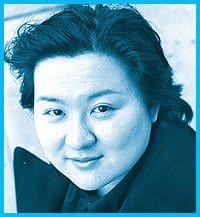“I came out officially when I was 17. Four years later my parents accept me, my family accepts me, my friends accept me, and I think I’m one of the lucky few who is very proud of being who I am,” says Thelma Zee, the 21-year-old founder of Chinese Lesbians Of Toronto.
A freelance web designer with a background in fine arts, Zee is one part artist, one part community organizer and one part entrepreneur.
Zee had planned for a while to start up an organization for Chinese lesbians, an idea that came to fruition late last year.
The problem she found was that Chinese lesbians in Toronto, most of whom were closeted, were making contact with each other through Asian-based websites rather than on Canadian turf.
With the majority of Chinese Torontonians living in Richmond Hill, Scarborough and North York, most lesbians in the community weren’t likely to make the trek to the gay village on Church, where cultural and linguistic barriers would only add to the geographical.
“Chinese culture, in terms of its views on gays and lesbians, is still conservative compared to the Westernized culture,” Zee says. “There’s still a long way to go for us. I think we’re pretty much invisible right now.”
Zee originally planned to creating an on-line community. However, soon after creating the CLOTO website, it was clear to her that Chinese lesbians in Toronto wanted to meet in person.
Zee and her friends – many of whom are straight Asians – immediately started organizing events. The first was a barbecue last fall in Miliken Park in Scarborough, which attracted 40 to 50 people. The second, and most successful with 70 attendees, was a Christmas party in North York. By the time of their Valentine’s party last month, attendance had grown to 60 people.
The linguistic barriers Chinese lesbians encounter in the queer community, however, were not absent at CLOTO events. Rather than mingling freely, attendees would pair off into Mandarin, Cantonese and English-speaking groups. For the Valentine’s event, organizers came up with a way to break the linguistic barriers through “speed dating.”
Originally devised by a Rabbi to get straight Jews to mingle at singles events, Zee modified speed dating to get CLOTO attendees to create friendships. Individuals are paired with one another for eight minutes. The two get to know each other, and if one person is interested in getting to know more, she tells Zee. If the feelings are mutual, Zee gives the two women each other’s contact information.
“I think they want to find someone they can relate to, someone with a similar culture and background,” she says.
“I think that’s the main thing, especially for new immigrants. They don’t feel comfortable speaking English and they would feel intimidated going to an all Caucasian party…. But in the Chinese community, for example CLOTO events, there are like-minded people like themselves. There’s Mandarin-speaking people, Cantonese-speaking people. We have people from Taiwan, China and Hong Kong, and a lot of people are born here, so we have quite a variety.”
* The website for CLOTO is www.cloto.org.

 Why you can trust Xtra
Why you can trust Xtra


